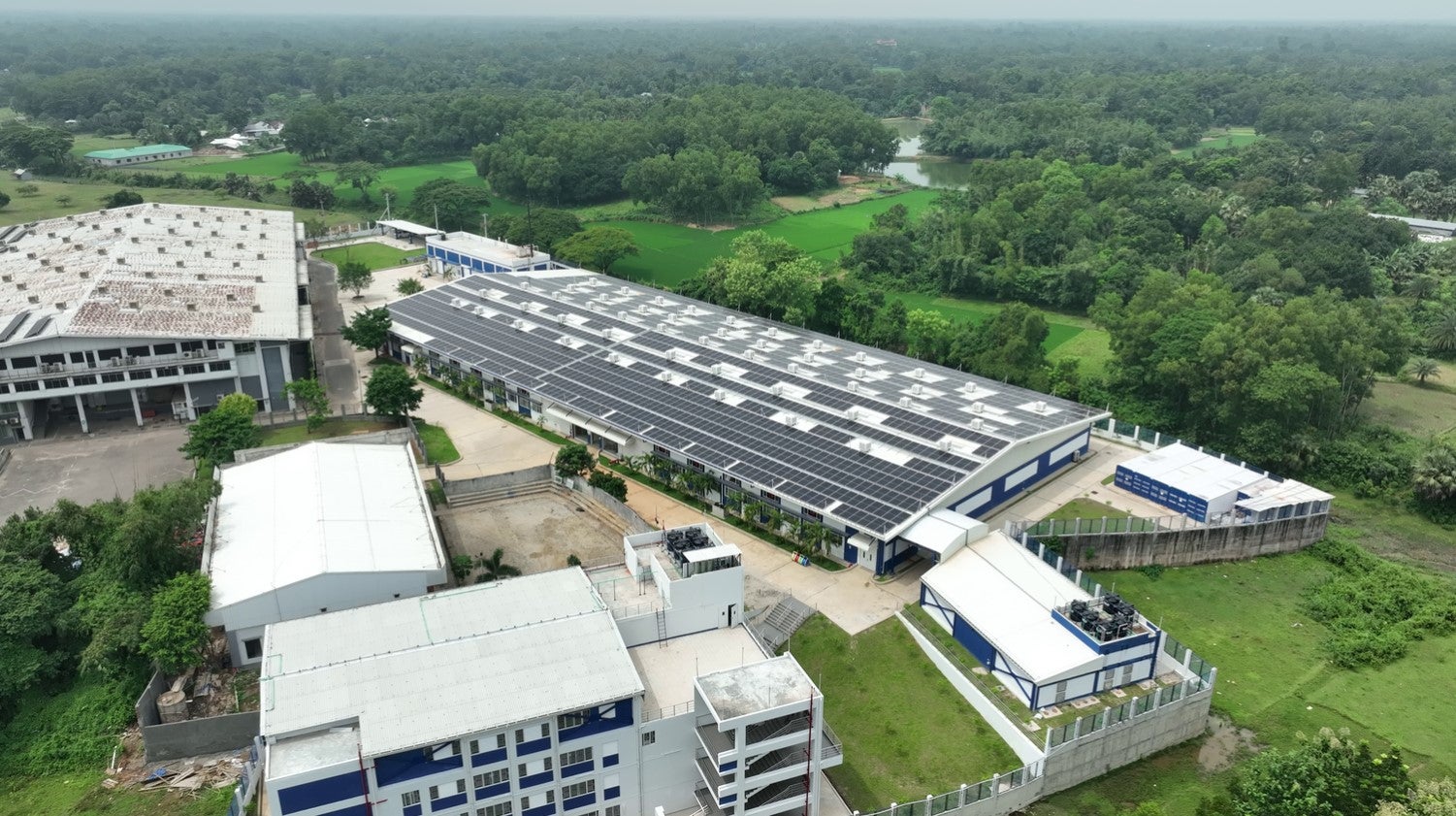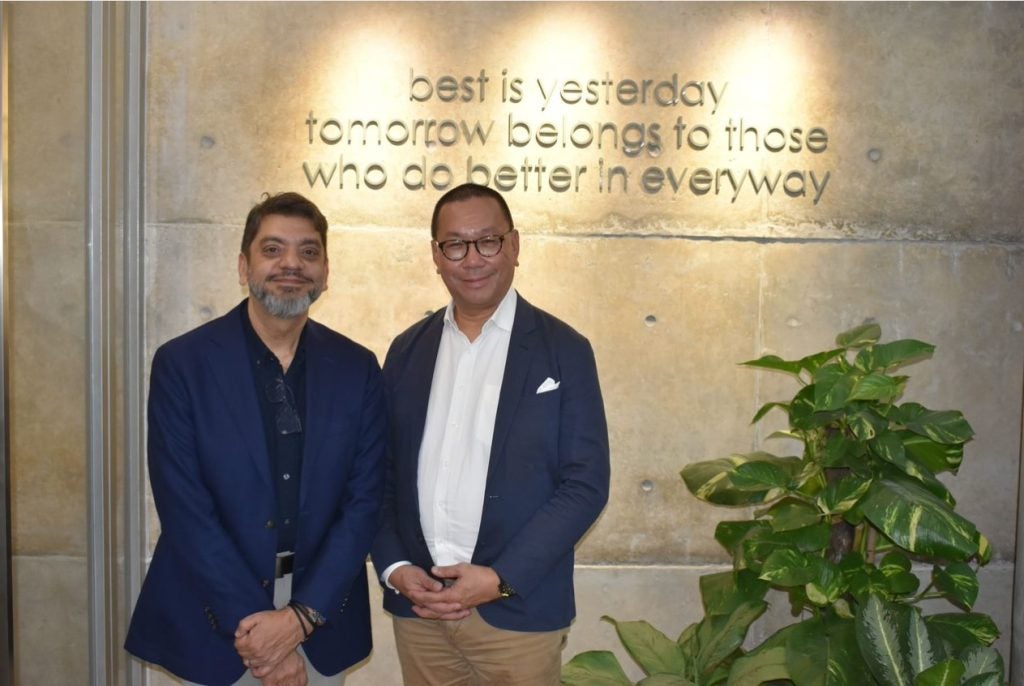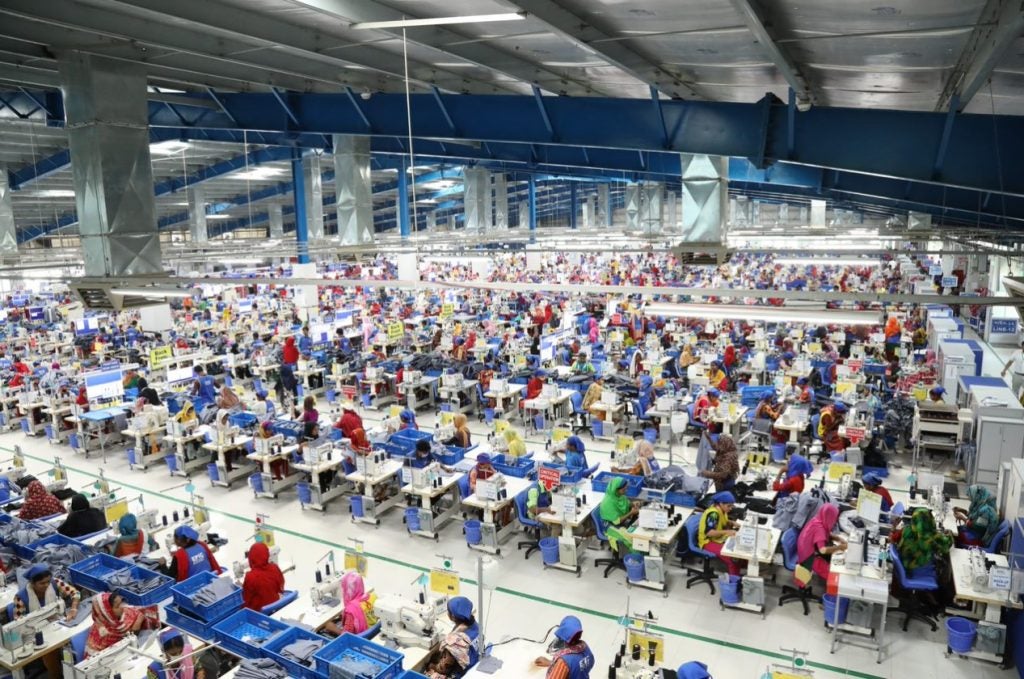
The fashion industry by its very definition is constantly evolving and while sat in an Italian restaurant on the rooftop of a luxury hotel in Dhaka, Bangladesh during Made in Bangladesh Week (which is arguably an oxymoron in itself), Young tells Just Style the Epic Group feels it’s time for some major disruption.
He says: “Being a garment manufacturer miles away from the end consumer is not going to be a successful business model in future,” and he believes change is afoot due to the current economic environment: “There’s so many issues with retailers having financial difficulties, the pending and looming recession, global supply chain challenges and the geo-political situation between China and the US.”

According to Young, the secret to success during these tricky times will be the art of leveraging partnerships within the fashion supply chain’s ecosystem and finding innovative ways of collaborating with technology providers, designers, fabric mills, retailers, and brands.
Disrupting the fashion industry with an innovative strategy
He points out that we’re looking towards a future that’s going to be very different from the past – and rightly so.
The key questions fashion suppliers need to be asking right now include: How do we more formally leverage our relationships with textile and fabric mills and what are the nearshoring opportunities for our customers?
Young cites speed as being essential, and adds: “How can technology be used to connect the front of the supply chain with the back both quickly and cost-efficiently?” Finally, he says quizzically: How do we predict what consumers want and leverage the data analytics in a way that allows us to partner with retailers and reduce their inventories and markdowns?
He’s confident the Epic Group is best placed to tie all these questions and answers together with the notion of sustainability front and centre.
As he explains in a calm and collected voice: “We are building the best leading sustainable apparel supply chain of the future.”
The Epic Group, which has its headquarters in Hong Kong, supplies major fashion brands and its chairman, Ranjan Mahtani, is a visionary in every sense of the word and runs the Epic Group with the motto: “The relentless pursuit of better”.
It is this motto and Mahtani’s entrepreneurial spirit that inspired Young to join the company and take the lead on its strategy during the Covid years and beyond.
Young explains: “We’re taking our mission statement and understanding what it means for our core stakeholders and the communities in which we serve — that’s the focus of our strategy for the next few years.”
The secret behind the Epic Group’s success to date
Young, however was keen for Just Style to speak to the man behind the brand himself, and in the organiser’s room behind the main stage of the Dhaka Apparel Summit, Mahtani took some time out of his crazy schedule to reveal the secret behind his success to date.
From day one Mahtani’s company has taken a proactive approach to helping its customers. He shares casually: “We give our customers solutions and that allows them to sleep at night — we take their problems and solve them. We’ve always been forward thinking in terms of trends, and we look at what impacts our customers most and serve them in multiple ways.”
He adds: “We don’t just offer a factory – we offer design, warehousing and suggest future items based on sales. We do everything a domestic importer would do because customers want the full package — they want a vendor that will fill their shelves, give them the margins they need and take responsibility for the merchandise. In other words, we take on 360-degree responsibility.”
The Epic Group’s focus has always been on both its customers and its workers. He explains the company is constantly finding ways to improve their lives. The Epic University, which is based at its Bangladesh factory of the future, is a good example of this as it gives all garment workers training on soft skills, safety and hygiene, wages and staff management.
As a result, he says, “we have happy workers, low attrition, and absence rates, which all helps with productivity and quality. We’ve gone through a lot of crises together – be it Covid or recessions but we always come out stronger”.
In fact, as of June 2022 the Epic Group, had its biggest year yet with 44% growth – impressive given the struggles the fashion sector faced during Covid. However, Mahtani argues the challenge often becomes the opportunity.
What’s immediately clear, however is that none of the Epic Group’s success is by chance. Even Mahtani admits that over the last three to four years he’s made it his mission to assemble what he describes as a very professional team and this is a major part of his latest disruptive business plan, which is clearly already generating results.
He says modestly: “I’ve put people around me who work smarter than me and they’re taking the Epic Group to the next level. We’re hoping to be a US$2bn company and we have a three-year plan for that.”
He adds: “Organically we’re growing about 10-15% every year but now it’s all about getting into a new ball game so we can multiply our numbers faster.”
Mahtani is extremely knowledgeable and every word he utters effortlessly imparts wisdom so it’s quick to see why the Epic Group has managed to say ahead of the game for so long.
When quizzed about his biggest competitors, without a second thought he replies: “Our biggest competitor is ourselves. There’s a lot of services we can improve – if we can work on those then the sky is the limit.”
He continues: “We’re constantly learning, for example we’ve put RFID tags in the factory, and I have an app connected to them on my phone so I can zero in on quality and productivity 24/7. It’s one part of digitalisation we’re focusing on – we’re setting up a strong tech team, we’re looking at AI with fabric inspections and sensors on the floor to check quality.”
He can’t deny the world is facing tough times but he’s extremely proud of what he’s achieved such as his ‘sustainable factory of the future,’ which is based in Bangladesh. He’s also confident that every factory to open thereafter will take the learnings from this space and improve on them, such as the new factory opening in Jordan later this year, and the large hub he’s planning to open in India.
Agile, lean and green: bringing the sustainable factory of the future to the world
Just Style received a personal tour of the Leadership in Energy and Environmental Design (LEED) platinum certified garment manufacturing complex in Dhaka, Bangladesh, to understand why it has been dubbed the sustainable factory of the future.
It started with a helicopter ride from the capital across the country’s beautiful green wetlands that landed on a helipad at the neighbouring school where many of the garment workers’ children attend.
The impressive sustainable complex focuses on automated, sustainable, and agile manufacturing to ensure it is flexible and resilient to change. This brief means the factory not only supports key environmental goals thanks to the factory’s building design with the likes of solar panels, but it also supports sustainable processes such as turning waste into fuel, and supporting social responsibility by providing workers with higher skilled job opportunities thanks to its use of cutting edge automated technology.

The best way to describe the complex is a modern university campus – it feels vast and airy despite it having thousands of workers producing garments on the site each day. It exudes a positive energy and the personal touch does not go amiss. In fact, the supervisors ensure each workers’ birthday is celebrated by presenting them with a personalised card signed by the managers, a gift and by singing happy birthday in front of everyone on the factory floor.
The Epic Group’s focus on delivering customers a sustainable and vertical end-to-end supply chain means its in-house design and production team, headed up by Jerrick Gray, create fashion designs based on what’s both cost-effective and sustainable.
Gray tells Just Style: “My role involves making sure everyone is aware of sustainability and the simple steps that can be made to improve it.”
He explains that seeing the processes at the factory first-hand helps him from a traceability and visibility point of view: “It helps us to understand how long it takes to produce a garment from end-to-end and to see how our simple alterations to the design can streamline the factory process as well.”
When sourcing fabrics he looks for post-consumer and natural dye options that can be used efficiently across different brands and leveraged with recycled polyester and cotton.
The everchanging fashion sourcing destination roadmap
Mahtani confesses there will be some acquisitions down the line and suggests a good foundation is now in place to do other things. He points out: “That’s my job and together with Young and making the right acquisitions we can grow the company and make the right diversification of product, country and supply chain – we’re moving towards a major transformation.”
For Mahtani and indeed Young being one step ahead of the game in terms of choosing the right places to build factories and invest is a crucial part of any bulletproof business strategy.
In that vein it comes as no surprise that Mahtani chose Bangladesh to unveil his first ‘sustainable factory of the future’ given he saw the country’s potential and started investing in it over 40 years ago, while the rest of the world has only just started playing catch up.
Young explains: “When he first came in the 1980s he thought it would be huge and he contributed to putting Bangladesh on the map and most of our operations remain here.”
Young admits however that it wouldn’t be a sensible business strategy to put all eggs in one basket given the rise of nearshoring, the challenges experienced during the Covid years and the changing landscape of middle-income countries and where end consumers are based.
This explains why Epic Group is also opening a sustainable factory of the future in Jordan and why Mahtani is opening a major hub in India.
In fact, Young goes as far as to quote Amazon’s former CEO, Jeff Bezos, stating: “it’s India’s time.”
“You’re seeing it emerge as a powerhouse and population-wise in a year it could have the largest population in the world. It has a huge middle class and retailers see it as a strong emerging market. The country has a sound economic policy, a stable government, and our customers (retailers) want us to nearshore into India to expand in that market.”
He explains the Epic Group wants to follow its retail customers into the emerging markets. Similarly, ‘made in the USA’ is a growing trend with retailers bringing value-added manufacturing back to the US and Central America.
He says: “Nearshoring and onshoring close to our customers to where the demands lie remains a very important trend and we’re well positioned to deliver on that.”
When asked to provide a list of the countries with the most potential, he includes India and Central America given the proximity to the end middle class consumers. He also adds Vietnam because of its huge young population and Bangladesh because it is stable with an eager and committed workforce and remains cost competitive.
Why fashion suppliers should aid the direct-to-consumer trend
Not one to sit on his laurels, Mahtani admits that a business based purely around having garment factories is not enough in 2023 as there is just too much competition. He knows his customers want to reduce overheads and transfer more work to the Epic Group.
“Brands want vendors to take on more responsibility so in the next few years they might tell us to deliver direct to the consumer.
He reveals his company is already delivering direct to stores and he’s planning to set up a small unit in the US that does printing, washing and embroidering.
He adds: “We’re also looking to embark on nearshoring as part of our three-year plan and we’re going to zero in on a location in the US – it will be small due to cost and availability but we’re going to put an automated manufacturing unit there and tie in with Mexico to tick off the need for speed.”
For Mahtani, there’s the core Epic Group business where customers can afford the longer lead times and then there’s the e-commerce and fashion trend side which requires quick turnarounds as what consumers see on the catwalk, they’ll want to see in the shops in 60 days.
He explains: “We’ll only cater to small start-up ecommerce brands with 200 pieces of styling. We’re setting up a sample factory that’s flexible as our turnaround needs to be a day or two, however we’re already executing at seven days in our other factories.”
Disrupting with a new ecommerce fashion brand in China
Young points out that leveraging what the company has in terms of product design is crucial. He says: “We’re co-designing pieces as we have significant capability in the 3D digital space. It means we can leverage our full end-to-end strategy. There’s so much changing in the way consumers shop and we’re pretty on pulse thanks to Grey and his design team and our trends and analytics research means we can create something that’s in-demand yet unique.”
Mahtani agrees and highlights the next generation are not going to shop. He points out that when today’s ‘youngsters’ enter the workplace and become the new middle and upper class they will shop for clothes on their phone, expect to receive items in two days and take it back easily if they don’t like it – that’s the next revolution.
He concludes: “This business needs constant disruption because it is fashion-driven, which means no-one is ever an expert for long. The change is constant, so you always need to know what’s going on to help your partners. We must travel to new places, experiment with new machinery, do our own market research and absorb what’s going on every day.”



